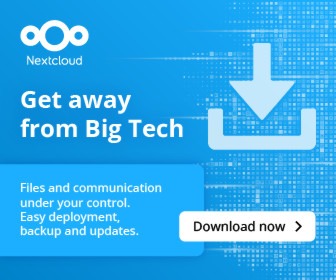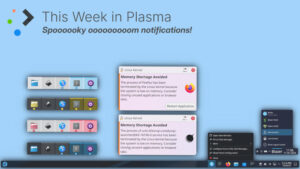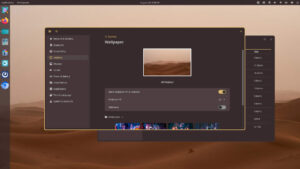The user base for Linux has changed dramatically over the past five years or so, which is yet another sign that the OS is gaining traction on the desktop.
Twelve years ago, when I first started using Linux, about the only people firing up the penguin to accomplish day to day chores were hard core technological geeks. The command line ruled, so much so that many Linux users knew more bash commands than words in their native languages.
Back then, most Linux users were drawn to the operating system precisely because it wasn’t dumbed down and because it put incredible power and stability at their fingertips. Linux was first and foremost a command line operating system. Even a newbie friendly distro such as Mandrake was going to require the occasional opening of a terminal to do some down and dirty work on a text screen.
 This wasn’t the case in the Windows world where, beginning with Windows 95, the command line became increasingly less relevant. Both Apple and Microsoft did their best to hide the underlying operating system from the user. Tinkering under the hood was discouraged and made difficult if not meaningless. Those weaned on Windows or Macs often had trouble understanding the appeal of the command line, where the user is much more tightly integrated with the machine.
This wasn’t the case in the Windows world where, beginning with Windows 95, the command line became increasingly less relevant. Both Apple and Microsoft did their best to hide the underlying operating system from the user. Tinkering under the hood was discouraged and made difficult if not meaningless. Those weaned on Windows or Macs often had trouble understanding the appeal of the command line, where the user is much more tightly integrated with the machine.
In those days, the Linux community was pretty much a private club for uber geeks. Newbies from the Windows world were not always made to feel welcome on the forums, especially if they were foolish enough to wonder aloud why Linux was so different from Windows. To get help, a newbie often had to grovel, praise Tux and acknowledge the superiority of those offering help. Dyed-in-the-wool Linux users were a pretty smug lot back then.
That’s all changed.
The uber geeks are still there, of course, in bigger numbers than ever before. Indeed, because these are the users who understand the inner workings of Linux best, they’re still the people who’re most likely offering help on the forums. But they’re not nearly as snarky towards the unwashed and unclean newbie, the Windows refugee, as they once were.
There’s a reason for that.
In 2014 there are probably as many newbies from Windows using Linux as there are traditional Linux power users. This new breed of Linux users often don’t particularly care that they can make their computers more secure by futzing with iptables or that they can increase performance by creating a swap partition and making a few adjustments to their swap parameters. They just want to open LibreOffice to write a paper or to work with a spreadsheet; fire up a browser to look something up, pay some bills, send a Tweet or play on Facebook; or perhaps load a financial app to balance a checkbook.
The user friendly distros have done a great job of accommodating this new set of Linux users. It’s now entirely possible for a new Linux user running something like Ubuntu or one of its derivatives to never once open a terminal and still have a pretty decent experience. Some of these new users, who might have initially come to Linux only to breath new life into an old computer until they can afford a new Windows box, might be curious enough to delve under the hood enough to discover that what they’re using isn’t merely a free OS that works on obsolete hardware, but a powerful and highly configurable operating system that puts Windows to shame on almost every level.
Don’t be fooled by a distro’s “user friendly” label. It’s all Linux under the hood.
Many of the users who come to Linux today with eyes wide open will move on to become the Linux geeks of tomorrow. Some of them will even find their way to the forums, helping an even newer generation of newcomers avoid the pitfalls that all newbies at first face. Today they might not even know that this is what the future holds in store for them. Right now, they’re just looking for something that works better than Windows.
Christine Hall has been a journalist since 1971. In 2001, she began writing a weekly consumer computer column and started covering Linux and FOSS in 2002 after making the switch to GNU/Linux. Follow her on Twitter: @BrideOfLinux









It is good to see someone who gets that Linux is Linux. Yes the groups that put out different distributions add their own flair, but in the end you have Linux underneath.
I am one of those “new guys”. I use Linux based OS’s because they work, and I don’t spend all my time updating virus and spyware programs, defragging hard drives and waiting for Windoze to update.
One still needs a strong IT background to get help in the Linux world. I am an oddity, an end user who misses MS DOS a bit for the reasons you gave. I have one of those “user friendly” distros (Pinguy 13) installed in a dual boot on another laptop. I don’t use it much because I can’t find user-friendly help to do anything beyond installing. Even getting rid of it entails more ability than I want to risk. My objectives in using this, besides security and the end-user objectives you gave, were about returning to the power I enjoyed with simple instruction in DOS that I obtained as a secretarial science major back in ’89. I have yet to find as friendly a source of learning Linux.
@Calvin Rittenhouse
Well, as to general help with various issues in the operating system, it seems to me that some of the friendlier places are the Ubuntu forums and the Mint forums. Of course, those aren’t particularly geared to command line help (though they don’t avoid it either).
If you really want to become absorbed in the command line though, it’s possible that the user friendly distributions which try to eliminate the need for using the command line (and thus for the people on the forums to know as much about it) are not really the best places to learn it. You might be better off ‘jumping into the deep end of the pool’ and trying to get set up with Arch Linux and their guides and forums, or with Slackware and LinuxQuestions.org. Those distributions aren’t for the feint of heart, though (Slackware was what I learned on fifteen years ago, though).
Another thing I would recommend, if possible, is to get to know Linux on a machine that you aren’t afraid of messing up. That is, it’s good to try and install Linux as the only operating system on a machine that you can use for everything, but that you don’t have to absolutely depend on for everything (you still have your old machine as a backup). Of course, I understand this may not be possible. One thing that can make it more possible is to remember that Linux tends to run well on significantly older hardware than current Windows machines run well on. It especially tends not to need as much hard drive space for the basic operating system (Windows 8 in particular seems to gobble up hard drive space).
@Calvin Rittenhouse
It’s interesting that you want Linux to be like DOS. Most people want it to be like Windows, but you want it to be like DOS, an operating system that became irrelevant to most of the world twenty years ago. I guess that goes to show that Linux really is the place to go for choice. I’m sure that if you continue to look with an open mind, you will find the place where you feel at home.
With respect to this article, though, I think the point is that Linux is really for people who want Linux to be like Linux.
rjb
I guess in the end I agree with your last line. Linux is really for people who want Linux to be Linux (not accessible to ordinary people).
We Linux users are extraordinary, aren’t we?-)
I’m a non-techie, who started using Linux (Debian) in 2000, and I never experienced this famous uber-geek unfriendliness. Of course, I didn’t trash-talk the OS either, or act like some privileged customer who’d shelled out $100 for the operating system and expected the help-desk peon to accommodate my entitled snits.
@Calvin Rittenhouse — CFWhitman gave some excellent advice. Though the commandline is generally easily accessible on any Linux distro.
I’d suggest you check out the “top ten” page at DistroWatch
( http://distrowatch.com/dwres.php?resource=major )
to find a widely-used/well-supported popular, user-friendly Linux distribution. (I hear nice things about Pinguy, but I wouldn’t say it’s particularly commonly-used distro.)
Also, it’s worth repeating that LinuxQuestions.Org
( http://www.linuxquestions.org/ )
is indeed an excellent forum to find knowledgeable and friendly help installing or using many Linux OSs and applications (including the command-line stuff you appear to be most interested in).
Here’s the rub – GNU/Linux wasn’t started to provide the masses with a free or easy alternative to Windows, though it has been co-opted into that role.
It was started to provide a libre alternative – ie; no proprietary blobs, because they come with licences, restrictions and quite probably backdoors as well. It was meant to put 100% of the power back in the user’s hands and was not intended that the user then went out and handed that power straight back.
If you want easy – stick to Windows/OSX.
If you want freedom, switch to GNU/Linux.
But please, stop telling people it’s OK to compromise themselves by having Linux and then ruining it and stop encouraging those who are quite eminently unsuited to using a libre OS. And by “eminently unsuited” I don’t mean ‘technically inexperienced’, I mean indifferent to the work, dedication and beliefs that went in to the creation of libre software.
The Corporations hate freedom and individuality and personal knowledge and the assertion of rights – they like stupid, docile consumers, who don’t care how their machine does what it does, as long as it does it. If they could wipe libre software out they’d do so in a heartbeat. The only way we’re ever going to get major changes to happen is when a lot of people are using libre software and are demanding an end to proprietary binaries and surveillance routines and that’s not going to happen while half the Linux world goes around telling everyone else that they can stuff their boxes with proprietary garbage and still be “good little freedom fighters”.
It’s not Linux under the hood: It’s GNU under the hood with Linux as the drivetrain.
“GNU/Linux wasn’t started to provide the masses with a free or easy alternative to Windows, though it has been co-opted into that role”
That approach is exactly why Linus Torvalds will never “get the desktop” he wants, and why you will hear no more from me.
@Calvin Rittenhouse Don’t let one bad attitude scare you away.
If it was only one it wouldn’t bother me. And I’m not scared, I’m annoyed.
I worry that Linux, in general, is heading down a dangerous road. There used to be clear layers of drivers, services, libraries, etc. More and more end-user components are reaching deeply into the lower layers for various reasons.
Consider the fate of X-windows. While the need for the network implementation may be minimal, that separation enabled either side — the processing vs. imput and display — to evolve at their own pace. Of course this evolution required coordination, but intense dependency was not part of the situation.
A modern workstation wants to get optimal use of available graphics hardware. That often requires direct access to the hardware, so Xorg (modern X-windows) has serveral competing implementation under development. The desktop environment folks want those same benefits and have embraced that same approach.
It seems that the days of run-there-display-here are numbered, and, yes, its all Linux.
It is not a bad attitude to point out the truth about the motives behind the development of GNU/Linux.
You are entitled to disagree with those motives, you are entitled to state a desire to live by different ones, what you are not entitled to do is rewrite history because it doesn’t fit your personal opinions.
I believe that it doesn’t matter what you want to call it….GNU/Linux……Linux……Open Source software. ..the bottom line is – It’s Not Proprietary software with all kinds of loopholes…back-doors…licenses…and pay-as-you-go features. The premise behind using Linux (at least in MY opinion!) is not to just become the uber-elite geeksquad agent….it’s not to just “stick it to the man”….its not to claim some form of bragging rights, but the purpose of using Linux is to get things done in an easy fashion, with minimal out-of-pocket expenses and using hardware that you already own. I use a lot of different distros…the ones that have a “GNU” meme and those that don’t, but you know what? All that matter to me is the ability to GET THINGS DONE!….regardless if I’m using LibreOffice….or AbiWord…..or if I’m using Inkspot….or GIMP…the bottom line is I can accomplish my goals with very little technical “interference”. There’s a flavor of Linux for just about everyone on the planet…for those who want an MS-DOS type of world..to those who live “far left” and appreciate a desktop environment like Openbox…or Enlightenment….the petty “battles” that seem to come about regarding the naming convention of Linux (or GNU/Linux for those who insist upon it!) are the one deterrent that might cause a lot of would-be Linux users to shy away from it. (Would YOU want to join a group of people who seemed to be at odds with another group that were in the SAME camp!?..) But I digress the bottom line is…Linux is a LOT more prevalent than people might first think….from ATM machines….to gas station pumps….to touch screen interfaces at local retail stores and food outlets…..and then finally there’s the “Android” phenomena. Everywhere you look Linux is “taking over” in small even…steady, and un-relenting strides!
Android is a Google sweetie jar… the sort of sweeties that bad men hand out to children with a promise of some puppies if they get into the car…
Open source it may be; but try and leverage it!
Linux is only the dratted kernel; important, sure! Central? Absolutely! But not the whole thing. Open Source software also includes BSD (which isn’t Linux, nor even GNU) but it’s still damn fine software.
I’ve recently been testing PingyOS, ElementaryOS (both Linux) and GhostBSD 4
All three have blown me away with their ease of use and sheer beauty; these guys are champing at Apple’s heels – nicking most of their ideas; but that’s no matter because now I have a choice of open and free operating systems that I can deliver to my friends who are struggling with old XP (or Vista) machines and don’t have the money to upgrade to something else from Redmond.